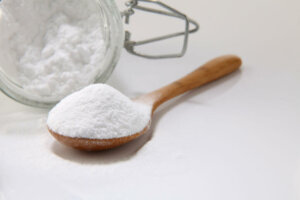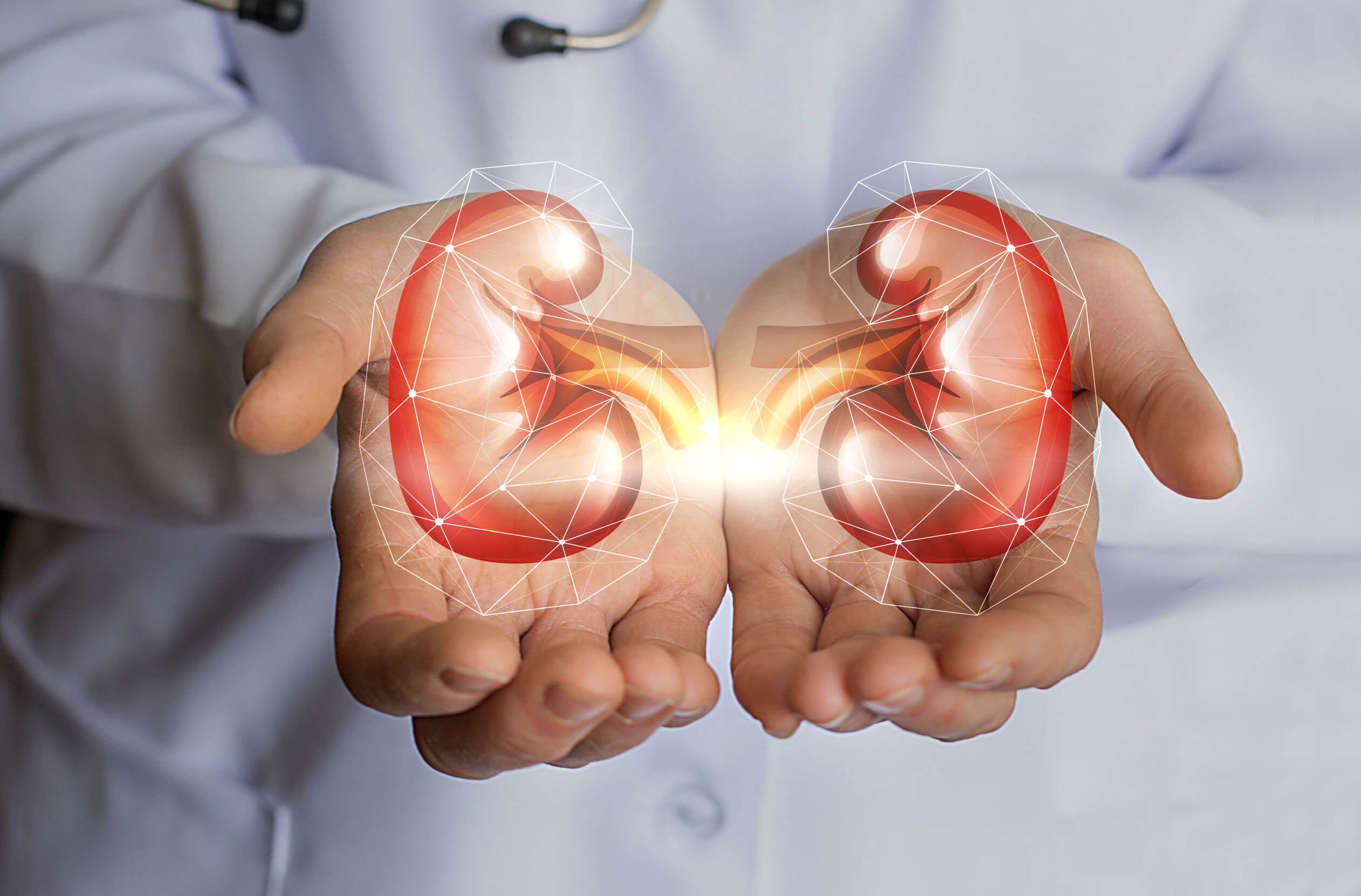Baking Soda: What Is It For?

These days there are products for domestic use that were used in the treatment of several conditions many years ago. An example of this is bicarbonate (NaHCO3), or baking soda, which has medical utility to alleviate the symptoms of many conditions, however, its use has decreased due to the appearance of more effective drugs.
This substance is also known as baking soda, sodium acid carbonate, or vichy salt. It’s a white and crystalline powder, soluble in water, which is obtained from a natural mineral called natron. In the home, it’s used to clean surfaces of various kinds and when baking cakes.
In the medical field, bicarbonate can be administered both orally and intravenously. In this way, it’s possible to find the compound in the form of injectable powders, tablets, or ampoules. The form of administration will depend on the condition to be treated and the severity of the situation.
Functions of bicarbonate in the body

Bicarbonate fulfills various functions within the body, the main one being to participate in a process called acid-base balance. This process is responsible for maintaining body pH within normal levels and preventing its increase or decrease.
In the human body there are different ways to obtain the necessary amount of the compound in question. Studies have shown that the kidneys are responsible for replenishing the bicarbonate used to buffer the blood pH. In this way, they are capable of increasing the synthesis and decreasing the elimination of the substance.
A part of the bicarbonate found in the blood comes from intestinal absorption through diet. In this sense, the absorptive process of the compound can increase or decrease, depending on the requirements of the organism.
The bicarbonate produced by the human body is capable of capturing and breaking down substances that lower blood pH, bringing it to more basic levels. The compounds generated by this decomposition will be water and carbon dioxide, which can be expelled through urine and respiration.
What is baking soda for?
Baking soda has multiple domestic uses, one of the main ones being household cleaning. This substance is capable of quickly removing grease and grime from multiple surfaces, as well as removing bad odors.
Strange as it may sound, bicarbonate has medicinal applications when properly processed. In this sense, the compound can be used in the treatment of some conditions, among which the following stand out:
Metabolic acidosis
Acidosis is an acid-base balance disorder characterized by a decrease in blood pH, making it more acidic than normal. This disorder can generate a systemic failure if it isn’t corrected in time, causing damage to vital organs.
The causes of a metabolic acidosis can be very varied, such as a case of uncontrolled diabetes mellitus. Some newborn babies may present this alteration due to congenital kidney damage.
Multiple studies show that bicarbonate is useful in the treatment of acidosis when it’s the product of a deficiency of this compound. However, there’s no scientific evidence to conclusively support its use in other types of acidosis.
Heartburn or heartburn
Another of the main uses of bicarbonate is in relieving heartburn. This is a condition that appears due to an increase in the amount of hydrochloric acid in the stomach, which causes abdominal pain or burning, and gastroesophageal reflux in most cases.
This compound can be combined with other medications to generate faster and more sustained relief of symptoms over time. Studies show that patients who take omeprazole and sodium bicarbonate pills get complete relief from symptoms within 30 minutes.
Baking soda is an essential component of some antacids, as it quickly reduces heartburn. When ingested orally, it renders the hydrochloric acid in the stomach useless and relieves the symptoms presented immediately.
Mouth infections
The mouth has its own natural microbiota, making it a place full of different microorganisms. This large number of bacteria can cause various conditions to occur in the mouth and throat. Among the most common problems are bad breath or halitosis, stomatitis or canker sores and periodontitis.
Bicarbonate has antimicrobial properties, which is why it’s capable of eliminating multiple agents that are harmful to health. In fact, studies have shown that it can be diluted in water and be a patient-friendly mouthwash to help you treat common mouth infections.
Poisonings
Most of the marketed drugs have renal excretion. It is important to remember that urine has an acidic pH under physiological conditions, which causes medicines with a basic pH to become trapped and expelled faster.
Large amounts of bicarbonate in the body have the ability to make the urine pH more basic. This ability can be used in drug and heavy metal poisoning. By making the urine more basic, the excretion of acidic drugs such as some antidepressants is facilitated, thus reducing the effects of intoxication.
Side effects of baking soda

As with all commercialized drugs, bicarbonate can cause certain side effects in the body. However, they will depend on the route of administration and the dose ingested. Thus, when administered orally, the following symptoms may appear:
- Feeling thirsty
- Intestinal cramps
- Gas or flatulence
- Loss of appetite
All of them usually disappear on their own within a few hours, however, you should consult your doctor if they get worse or are very intense. In addition, the oral intake of bicarbonate can cause bleeding, so you should contact the specialist if you vomit blood, have black stools, or blood in the stools or urine.
Intravenous administration of the compound can generate side effects when carried out at high doses or at high rates. In these cases, the patient may develop the following signs and symptoms:
- Excessive increase in blood pH
- Decrease in calcium and potassium levels in the blood
- Prolonged muscle spasms
- Mood swings and irritability
- Arrhythmias and hypotension
- Cerebral haemorrhage
- Increase in sodium levels in the blood and fluid retention
A compound with many uses and side effects
Bicarbonate is a substance that was used for a long time to treat heartburn. However, today it isn’t the first choice medicine. Over the years, other compounds have emerged that are more effective and cause less harm to the body.
Currently, it’s used to enhance the action of many drugs and in the treatment of certain specific metabolic disorders. However, its administration must be carried out under strict medical supervision, especially in the case of injectable ampoules.
These days there are products for domestic use that were used in the treatment of several conditions many years ago. An example of this is bicarbonate (NaHCO3), or baking soda, which has medical utility to alleviate the symptoms of many conditions, however, its use has decreased due to the appearance of more effective drugs.
This substance is also known as baking soda, sodium acid carbonate, or vichy salt. It’s a white and crystalline powder, soluble in water, which is obtained from a natural mineral called natron. In the home, it’s used to clean surfaces of various kinds and when baking cakes.
In the medical field, bicarbonate can be administered both orally and intravenously. In this way, it’s possible to find the compound in the form of injectable powders, tablets, or ampoules. The form of administration will depend on the condition to be treated and the severity of the situation.
Functions of bicarbonate in the body

Bicarbonate fulfills various functions within the body, the main one being to participate in a process called acid-base balance. This process is responsible for maintaining body pH within normal levels and preventing its increase or decrease.
In the human body there are different ways to obtain the necessary amount of the compound in question. Studies have shown that the kidneys are responsible for replenishing the bicarbonate used to buffer the blood pH. In this way, they are capable of increasing the synthesis and decreasing the elimination of the substance.
A part of the bicarbonate found in the blood comes from intestinal absorption through diet. In this sense, the absorptive process of the compound can increase or decrease, depending on the requirements of the organism.
The bicarbonate produced by the human body is capable of capturing and breaking down substances that lower blood pH, bringing it to more basic levels. The compounds generated by this decomposition will be water and carbon dioxide, which can be expelled through urine and respiration.
What is baking soda for?
Baking soda has multiple domestic uses, one of the main ones being household cleaning. This substance is capable of quickly removing grease and grime from multiple surfaces, as well as removing bad odors.
Strange as it may sound, bicarbonate has medicinal applications when properly processed. In this sense, the compound can be used in the treatment of some conditions, among which the following stand out:
Metabolic acidosis
Acidosis is an acid-base balance disorder characterized by a decrease in blood pH, making it more acidic than normal. This disorder can generate a systemic failure if it isn’t corrected in time, causing damage to vital organs.
The causes of a metabolic acidosis can be very varied, such as a case of uncontrolled diabetes mellitus. Some newborn babies may present this alteration due to congenital kidney damage.
Multiple studies show that bicarbonate is useful in the treatment of acidosis when it’s the product of a deficiency of this compound. However, there’s no scientific evidence to conclusively support its use in other types of acidosis.
Heartburn or heartburn
Another of the main uses of bicarbonate is in relieving heartburn. This is a condition that appears due to an increase in the amount of hydrochloric acid in the stomach, which causes abdominal pain or burning, and gastroesophageal reflux in most cases.
This compound can be combined with other medications to generate faster and more sustained relief of symptoms over time. Studies show that patients who take omeprazole and sodium bicarbonate pills get complete relief from symptoms within 30 minutes.
Baking soda is an essential component of some antacids, as it quickly reduces heartburn. When ingested orally, it renders the hydrochloric acid in the stomach useless and relieves the symptoms presented immediately.
Mouth infections
The mouth has its own natural microbiota, making it a place full of different microorganisms. This large number of bacteria can cause various conditions to occur in the mouth and throat. Among the most common problems are bad breath or halitosis, stomatitis or canker sores and periodontitis.
Bicarbonate has antimicrobial properties, which is why it’s capable of eliminating multiple agents that are harmful to health. In fact, studies have shown that it can be diluted in water and be a patient-friendly mouthwash to help you treat common mouth infections.
Poisonings
Most of the marketed drugs have renal excretion. It is important to remember that urine has an acidic pH under physiological conditions, which causes medicines with a basic pH to become trapped and expelled faster.
Large amounts of bicarbonate in the body have the ability to make the urine pH more basic. This ability can be used in drug and heavy metal poisoning. By making the urine more basic, the excretion of acidic drugs such as some antidepressants is facilitated, thus reducing the effects of intoxication.
Side effects of baking soda

As with all commercialized drugs, bicarbonate can cause certain side effects in the body. However, they will depend on the route of administration and the dose ingested. Thus, when administered orally, the following symptoms may appear:
- Feeling thirsty
- Intestinal cramps
- Gas or flatulence
- Loss of appetite
All of them usually disappear on their own within a few hours, however, you should consult your doctor if they get worse or are very intense. In addition, the oral intake of bicarbonate can cause bleeding, so you should contact the specialist if you vomit blood, have black stools, or blood in the stools or urine.
Intravenous administration of the compound can generate side effects when carried out at high doses or at high rates. In these cases, the patient may develop the following signs and symptoms:
- Excessive increase in blood pH
- Decrease in calcium and potassium levels in the blood
- Prolonged muscle spasms
- Mood swings and irritability
- Arrhythmias and hypotension
- Cerebral haemorrhage
- Increase in sodium levels in the blood and fluid retention
A compound with many uses and side effects
Bicarbonate is a substance that was used for a long time to treat heartburn. However, today it isn’t the first choice medicine. Over the years, other compounds have emerged that are more effective and cause less harm to the body.
Currently, it’s used to enhance the action of many drugs and in the treatment of certain specific metabolic disorders. However, its administration must be carried out under strict medical supervision, especially in the case of injectable ampoules.
- Mendoza Medellín A. Funcionamiento e importancia del sistema bicarbonato/CO2 en la regulación del pH sanguíneo. CIENCIA ergo-sum, Revista Científica Multidisciplinaria de Prospectiva. 2008;15(2):155-160.
- Higuera-de-la-Tijera F. Efficacy of omeprazole/sodium bicarbonate treatment in gastroesophageal reflux disease: a systematic review. Medwave. 2018 Mar 14;18(2):e7179.
- Madeswaran S, Jayachandran S. Sodium bicarbonate: A review and its uses in dentistry. Indian J Dent Res. 2018 Sep-Oct;29(5):672-677.
- Collins A, Sahni R. Uses and misuses of sodium bicarbonate in the neonatal intensive care unit. Semin Fetal Neonatal Med. 2017 Oct;22(5):336-341.
- Beaume J, Braconnier A, Dolley-Hitze T, Bertocchio JP. Bicarbonate : de la physiologie aux applications thérapeutiques pour tout clinicien [Bicarbonate: From physiology to treatment for all clinicians]. Nephrol Ther. 2018 Feb;14(1):13-23.
- Tanemoto M. Calculated Bicarbonate for Acid-Base Disorders. Am J Med. 2017 Oct;130(10):1135-1136.
Este texto se ofrece únicamente con propósitos informativos y no reemplaza la consulta con un profesional. Ante dudas, consulta a tu especialista.







